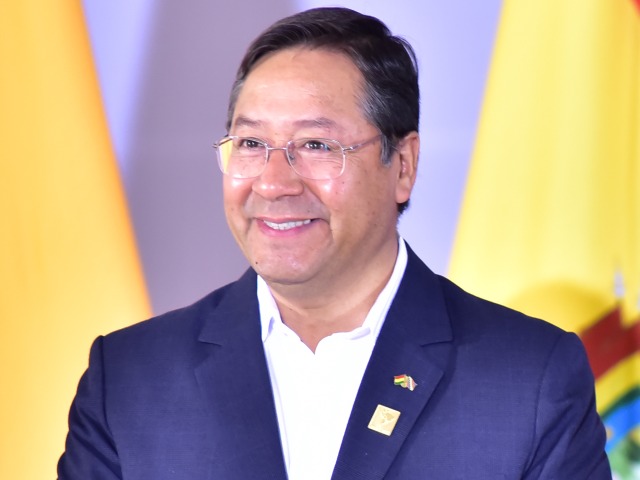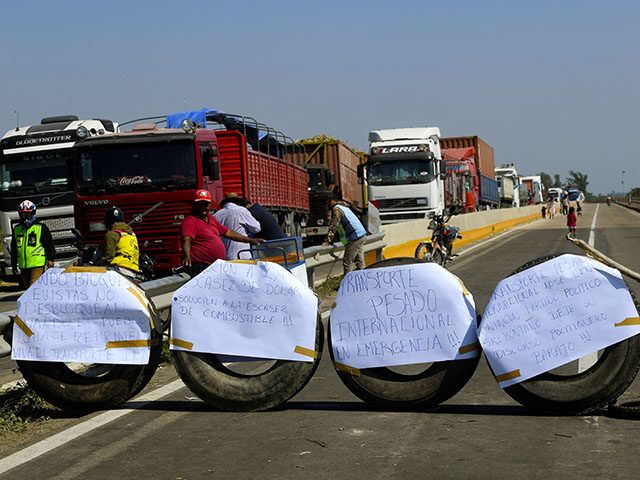Truckers in Bolivia carried out a two-day blockade of some of the country’s key roads to protest against the government of socialist President Luis Arce over ongoing shortages of diesel fuel and foreign currency, which have severely affected the truckers’ ability to continue their labor.
The blockade reportedly began in the early midnight hours of Monday, with truckers preventing access to the entrance of the Guillermo Elder Bell refinery located in the Santa Cruz department, a region considered to be Bolivia’s “economic engine” (a department is a state-level region in Bolivia). By Tuesday, there were ten major blockade points spread across four Bolivian departments.

Luis Arce, Bolivia’s president, during the South America Summit at the Itamaraty Palace in Brasilia, Brazil, May 30, 2023. (Ton Molina/Bloomberg via Getty Images)
The truckers denounced an ongoing shortage of diesel fuel that severely impacts their labor, a situation that representatives of the truckers reportedly described as “disastrous,” explaining that they must work only one day at a time, stopping for another day or two, to search for diesel.
The truckers demanded that the socialist government of Bolivia grant them better access to foreign currencies — mainly, the United States dollar — explaining that, due to the ongoing shortage of foreign currency in the country, the truckers must rely on unfavorable black market currency exchanges to obtain spare parts for their vehicles. Additionally, the truckers explained that the black market’s higher exchange rates result in losses for the transportation sector when importing and exporting their products.
“We are mobilized at a national level in different departments where we are making it known that we have needs, answers that we need from the Government in the economic order,” Marcelo Cruz, leader of the Association of International Heavy Transport of Santa Cruz, told reporters.
Cruz demanded that the Bolivian government guarantee the supply of diesel fuel to the truckers, stressing that “a day we don’t work is a day without money” to maintain their respective homes.
RELATED VIDEO — BRAZIL BLOCKADE: Truckers Block Highways Across Brazil to Protest Apparent Election Results:
The blockade occurred at a time when Bolivia’s socialist President Luis Arce is presently undertaking an official visit to Russia to participate in the St. Petersburg International Economic Forum. Arce is also reportedly seeking to reactivate trade agreements with Russia to bolster Bolivia’s ailing economy, currently worsened by a continued drop in sales of natural gas, the country’s main export, which has left the country further starved of foreign currency.
Juan Yujra, a local heavy transport leader, told local media that while the blockades are “peaceful,” the protesters “will evaluate other forms of pressure” against the Bolivian government if it does not act to solve their problems.
“We are asking for a meeting to determine and improve our situation, which day by day is declining. We are going to have to eat our trucks bolt by bolt because we no longer earn,” Héctor Mercado, president of the Bolivian Chamber of Passenger Transport, told reporters Monday.
According to Bolivian Public Works Minister Édgar Montaño, the government will establish “technical table” talks starting on Thursday across the country to begin addressing the truckers’ demands and invited the protesters to participate in the conversations. Montaño, who first claimed on Monday that the blockades were the start of a purported “coup” against Arce, asserted that the results from the talks will be forwarded to the Bolivian president once he returns from Russia.
While the protesters lifted the two-day blockade as of Wednesday, they have reportedly rejected Montaño’s invitation and have demanded to meet with Arce personally. They announced a temporal pause in protests that will run until June 14 to give time for the Bolivian President to return from Russia.
“We have taken the decision to wait until June 14. If we are not tended to by our president by June 14, on June 17 we will start our mobilization indefinitely. This time it will be with border closures in Tambo Quemado and Pisiga,” the president of the Oruro Departmental Transportation Chamber Jorge Gutiérrez told the Bolivian newspaper El Deber on Wednesday.
“As a State dignitary, out of respect for a social organization, a letter should be sent. But we do not believe in the Minister’s actions, especially when he has mistreated us, he has even threatened us with criminal proceedings,” Gutiérrez continued. “What can we discuss with the Minister, nothing. That is why we ratify ourselves, we are only going to talk with the President. That is what the bases have determined.”
Christian K. Caruzo is a Venezuelan writer and documents life under socialism. You can follow him on Twitter here.

COMMENTS
Please let us know if you're having issues with commenting.